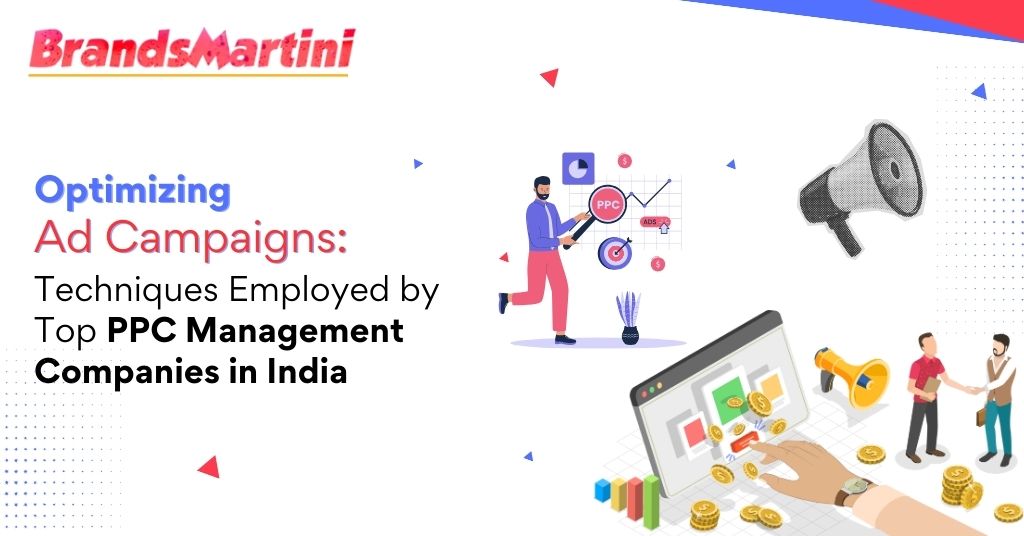Unit No. 101, 102,
Block - F, Plot No. 14,
Local Shopping Complex,
Bhera Enclave, Paschim Vihar,
New Delhi-11008783
The Power of Keywords: How to Optimize Your Business Website for Search Engines?

In today’s digital age, having a strong online presence is crucial for the success of any business. And to achieve that, you need your website to rank high on search engine results pages. But how do you make sure that your website appears at the top of these pages? The answer lies in keywords – those magical words or phrases that users type into search engines to find what they’re looking for. In this blog post, we’ll explore the Brands Martini – best digital marketing agency in Delhi NCR uses the power of keywords and show you how to optimize your business website for search engines like Google. So get ready to learn all about keyword research, local keywords, long-tail keywords and much more!
What are keywords?
Keywords are the backbone of any search engine optimization (SEO) strategy. They are words or phrases that users type into search engines to find what they’re looking for. For instance, if you run a digital marketing agency in Delhi, your potential customers might use keywords like “digital marketing agency in Delhi,” “SEO agency in Delhi,” or “PPC services India” to find businesses like yours.
Keyword research is the process of finding these relevant and high-traffic keywords that can help your website rank higher on search engine results pages. This involves understanding your target audience’s language, identifying trending topics in your industry, analyzing competitor websites and using keyword research tools.
Using keywords effectively on your website means incorporating them naturally throughout your content – from headlines and subheadings to body copy and meta descriptions. But beware – overusing keywords is known as ‘keyword stuffing,’ which can harm rather than improve your SEO efforts.
In summary, understanding what are keywords is crucial for optimizing your business website for search engines like Google. With effective keyword research and usage practices, you can increase traffic to your site organically by ranking higher on SERPs.
How to Research the Right Keywords for Your Business
When it comes to optimizing your website for search engines, one of the most important steps is researching the right keywords. But how do you go about finding those keywords? Here are a few tips.
Start by brainstorming: Think about what words or phrases potential customers might use when searching for businesses like yours. Write down as many ideas as you can come up with.
Use keyword research tools: There are plenty of free and paid tools available that can help you identify popular keywords related to your industry. Google’s Keyword Planner is a good place to start.
Look at your competitors: See what keywords they’re targeting and try to identify any gaps in their strategy that you could capitalize on.
Consider local SEO: If you’re a small business with a physical location, be sure to include location-based keywords in your research. This will help ensure that people in your area find you when searching for relevant services.
Keep an eye on trends: Keep up-to-date with changes in search behavior and adjust your strategy accordingly. For example, if more people start using voice search, you may need to focus on long-tail conversational keywords instead of short phrases.
By taking the time to research the right keywords for your business, you’ll be setting yourself up for success in the competitive world of online marketing.
How to Use Keywords on Your Website
Using keywords strategically on your website is crucial in helping search engines understand what your business offers. But how do you use them effectively? Here are some tips to help you get started.
First, make sure to include relevant keywords in the title tag of each page on your website. This helps search engines know what the page is about and can improve its ranking for those keywords.
Next, incorporate keywords throughout the content on each page, but avoid overusing them or “stuffing” them unnaturally into sentences. Instead, try to use variations of your main keyword and related terms that people might be searching for.
You should also consider using header tags (H1-H6) within your content and including important keywords in those headers. This not only helps with organization and readability but can also signal to search engines which topics are most important on a given page.
Don’t forget about meta descriptions – these short snippets that appear below titles in search results provide an opportunity to entice users with relevant information while incorporating targeted keywords.
The Importance of Local Keywords
When optimizing your website for search engines, don’t forget the importance of local keywords. These are specific words or phrases that people use when searching for businesses in their local area. Incorporating these keywords into your content can help improve your visibility in search results and attract more relevant traffic to your site.
One way to identify local keywords is by using location-based terms such as city names, neighborhoods or landmarks. For example, if you’re a digital marketing agency in Delhi, using keywords like “digital marketing agency in Delhi” can help you connect with potential customers who are specifically looking for services near them.
It’s also important to consider the intent behind local searches. People may be looking for information about opening hours, reviews or directions to your business. Including this type of information on your website and incorporating related keywords can help improve the user experience and drive conversions.
Don’t forget about mobile users! With more people than ever before accessing websites on their smartphones while on-the-go, targeting local keywords is crucial for reaching these users who may be searching for nearby businesses while out and about.
Long-Tail Keywords
Long-tail keywords are longer, more specific phrases that people use to search for something online. Rather than just searching for “digital marketing,” they might search for “best digital marketing agency in Delhi.” These types of searches tend to be more targeted and have a higher chance of converting into a sale or lead.
Using long-tail keywords on your website can help you reach these potential customers who are searching for exactly what you offer. By optimizing your content with these specific phrases, you increase the chances of showing up in their search results.
Long-tail keywords also tend to have less competition than broader terms, which means it may be easier to rank for them. This is particularly important if you’re a smaller business trying to compete against larger companies with bigger budgets.
However, it’s important not to overdo it with long-tail keywords. Your content should still read naturally and provide value to your readers. Focus on creating quality content first and using relevant long-tail keywords second.
How Often Should You Update Your Keywords?
When it comes to keyword optimization, it’s essential to keep your website up-to-date with the latest search trends. The frequency of updating keywords depends on various factors, including the industry you’re in and how often search terms change.
If you’re operating in a fast-paced industry where new products or services are frequently introduced, then updating your keywords more frequently is necessary. On the other hand, if your business operates in an industry that doesn’t experience much change over time, less frequent updates can suffice.
It’s important also to monitor your site’s analytics regularly to see which keywords are performing well and which ones aren’t. This information can help guide you as to when and how often you need to update your keywords.
You should also consider seasonal changes since customer behavior shifts throughout the year. Updating seasonal keywords will help drive traffic during these crucial times.
There isn’t a one-size-fits-all answer for how often you should update your website’s keywords. Still, keeping track of changes in search patterns and monitoring analytics regularly will undoubtedly give you direction on when and how often they should be updated.
Conclusion
In today’s digital age, optimizing your business website for search engines is crucial to increasing online visibility and driving traffic. By using the right keywords on your website, you can improve your rankings in search engine results pages and attract more potential customers.
When researching keywords for your business, take the time to understand your target audience and their specific needs. Use tools like Google Keyword Planner or SEMrush to find relevant keywords with low competition and high search volume.
Once you have a list of targeted keywords, incorporate them into various elements of your website such as page titles, headings, meta descriptions, content body and URLs. It is important to use them naturally without stuffing unnecessarily.
Additionally, don’t forget about local SEO by including location-specific keywords that will help potential customers find you easily. Long-tail Keywords are also an effective way of attracting niche audiences who are searching for specific products/services.
Remember that keyword research isn’t a one-time task; it should be updated regularly based on changing trends in user behavior and search algorithms. This will ensure that your website remains optimized for maximum visibility.
Optimizing Your Business Website for Search Engines through proper keyword research can help increase traffic leading to higher conversions resulting in increased revenue growth opportunities. So do not underestimate the power of appropriate usage of Keywords!

- Published on
- 21/04/2023
- By
- Brands Martini
- Categories:
found us interesting?
catch up over the drink
call us for meeting
(+91) 9999-30-3344











